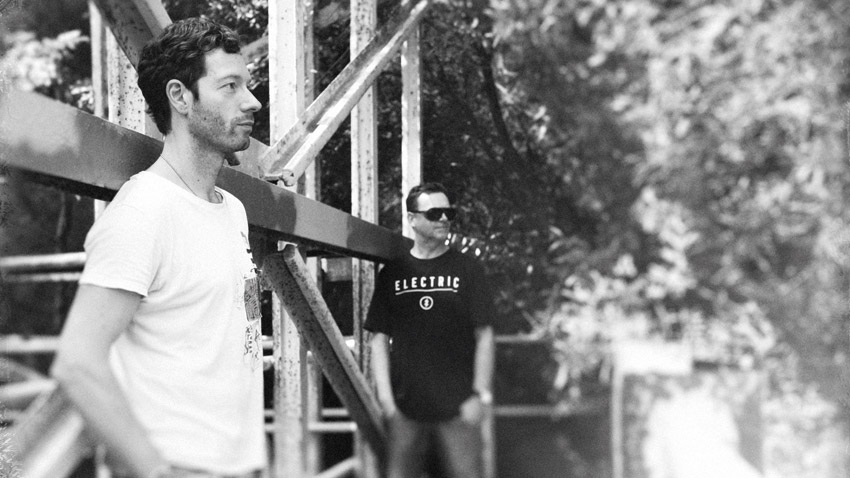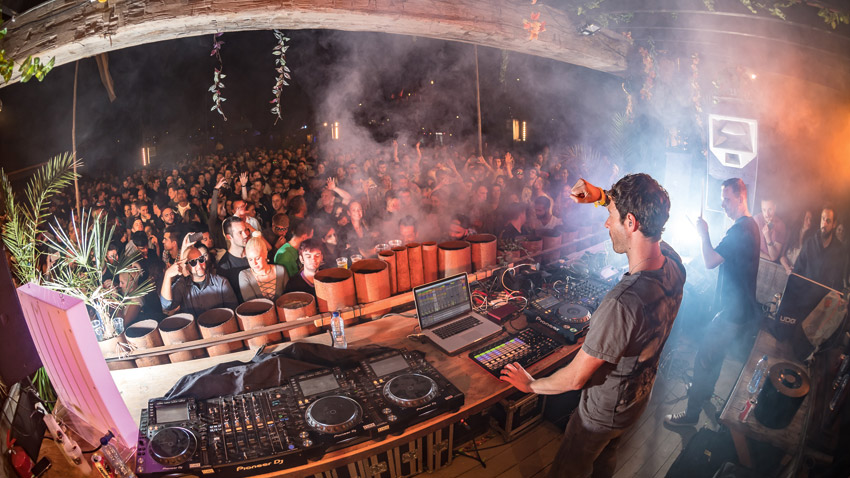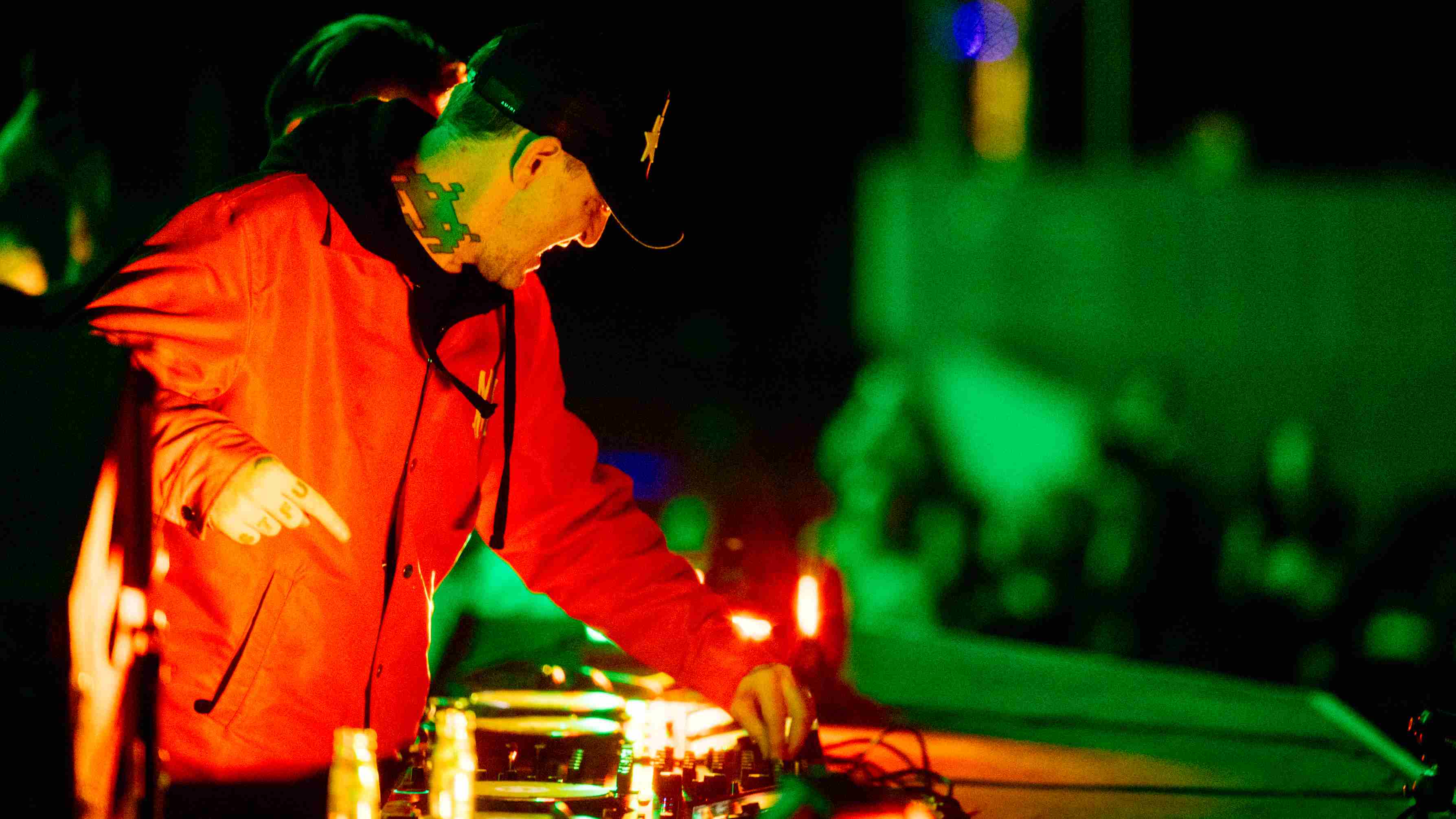Way Out West’s Jody Wisternoff on his partnership with Nick Warren and early musical life in Bristol
The progressive pioneers are back with a new album... except they never really went away!

“Everyone’s calling this the return of Way Out West, but as far as we were concerned, we never went away. There was a never a point where we said, ‘Right, that’s it! It’s the end!’. Way Out West was always there, always bubbling along. And we just decided it was time to put out an album.”
Jody Wisternoff makes it sound like a new Way Out West release is a regular occurrence, but the new album, Tuesday Maybe, is actually the first Way Out West collection since 2009. Back then, Gordon Brown was Prime Minister, Ronan Keating was Number One in the album chart and we were still watching analogue telly!
Although Wisternoff and his WOW partner, Nick Warren, did work on occasional singles and solo projects, and Warren cemented his position as a Premier League DJ, the duo were constantly quizzed about the next WOW release. That’s hardly surprising, really. Thanks to tracks like The Gift and Ajare, they were one of the most successful British names in the trance/progressive explosion of the late 90s and early 2000s.
“Eventually, our management sat us down and said, ‘You know that thing you used to do? Releasing Way Out West albums? We wondered if you might like to start thinking about doing it again’.” Wisternoff can’t help laughing. “We weren’t being awkward. There were always tracks being written and always new things on the go, but that final step never happened. I guess things changed when we started working on what eventually became the title track, Tuesday Maybe. We both felt that it was a very Way Out West song. We knew it was time to get back in the studio.”
How did it feel to be sitting down in the studio with Nick?
Jody Wisternoff: “Well, like I said, it’s not like we haven’t been speaking to each other for the last eight years. Way Out West has been… there. Still part of our lives. The only difference was that, in the studio, we were working on stuff separately.
“Once we sat down together, the process of making music changed quite a lot because you go from solo to a two-person democracy. I know that doesn’t sound much, but it makes a big difference. I’m sure most people reading this will know that, when you’re working on your own, it’s easy to start doubting a track, even when it’s perfect. And, conversely, it easy to start throwing a lot of time and effort into a tune that’s going nowhere. Basically, when you’re in that chair on your own, you can start disappearing up your own arse!
Get the MusicRadar Newsletter
Want all the hottest music and gear news, reviews, deals, features and more, direct to your inbox? Sign up here.
“Of course, not every track does work. Let’s say you make ten tracks - not every one of your babies is beautiful, and maybe one out of that lot will make it to the album. When you’re making music with someone who you trust, it removes a lot of the doubt and the disappearing-up-your-arse. It’s easier to work out which is the track to concentrate on. If we both felt good about a tune, we could be pretty sure that it was going to work. It means you’re not relying on the opinions of your mates or A&R.”
You’ve known Nick a long time…
“Haha! A very long time. I was probably about 16 or 17, and I used to buy my hip-hop in a shop called Tony’s Records. Nick worked in there. We got on, but didn’t start making music straight away. That came later. I heard he was looking for a producer and, at the time, I was getting pretty fed-up with what was happening on the rave scene. We sat down together and we immediately clicked. I started picking up some of Nick’s chilled-out Balearic vibes, and the rest, as they say, is history. Here we are 100 years later!”
You had quite a bit of experience by the time you started working with Nick. You’d worked with [Bristol pioneers] Smith & Mighty, and had become a well-known face on the Bristol scene…
“Even before I left school, I seemed to get pulled down that music path. I started having piano lessons when I was a kid, and one of my dad’s friends bought me a Casio CZ-1000 for my 14th birthday. Looking back, it seems a strange present - I probably would have preferred a bike! - but it opened up a new world.
“Up until that point, I kind of regarded synthesisers as complicated ‘toys’. I got my hands on a Wasp a couple of years earlier and it was great for making crazy noises, but that was about it. It didn’t really seem… musical. But, with the CZ, I started to put everything together. I could layer sounds, I could create things that I was hearing on my favourite records by Mantronix.
“As luck would have it, I also managed to get hold of an 808 when I was about 15.”
And paid £2.75 for it!
“Actually, it was about a hundred quid, which was quite a lot of money in those days, but I had to have it because it sounded like the drums I’d heard on the Run-DMC album. Believe me, I had no idea about the history of the 808 or what it stood for; it made hip-hop drum sounds, and that was all I cared about.
“With the 808, the CZ, and sequencing from an old Spectrum, I started making music. And the great thing about being a teenager is that you’re quite precocious; you think you can have a go at anything. In terms of experimentation, you don’t have any limits because you have no idea of what is musically ‘right’ or ‘wrong’. Your confidence and your imagination are at an all-time high.
“There was already a lot happening in Bristol, which made the whole music world seem a bit more ‘real’. Smith & Mighty, The Wild Bunch, Massive Attack… all this was happening on my doorstep in my hometown.”
Believe me, I had no idea about the history of the 808 or what it stood for; it made hip-hop drum sounds, and that was all I cared about.
A lot has been written and said about the Bristol ‘sound’, but it’s always interesting to hear from artists who were there at the time. Care to contribute to the debate?
“Absolutely! Being in Bristol had a huge impact on my life. I was being dragged to house parties when I was 15, witnessing the birth of this new ‘Bristol’ sound. You’ve got to remember that I was still at school, so this stuff was blowing my mind. All I can say is, thank God my parents were too lazy to get a babysitter.
“My brother was a rapper, so we were bumping into people like Tricky and 3D [Massive Attack]. Then, of course, there was Smith & Mighty who are, as far as I’m concerned, the originators of the Bristol sound. They took me and my brother under their wing and were very generous in terms of advice, encouragement and studio time.
“Had I been born in a different city, would I have ended up being a musician? I honestly don’t know. One of the big advantages of Bristol was that it wasn’t London. There wasn’t that pressure… the need to sound like the next big thing. Some people reckon the multicultural character of the city had a big part to play, too. On any Saturday night, you could hear a real melting pot of sounds - dub, early house, hip-hop, beautiful vocals, luscious strings. The music was all over the place, but in Bristol, it made sense.
“Maybe it’s something in the water down here!”
By the time you and Nick were working as Way Out West, what was in the studio?
“It was a full-on hardware setup. Like everyone at that time, we were sequencing from an Atari with Cubase and Notator, a couple of synths, and most of the work being done by samplers. Being synth geeks and all that kind of thing wasn’t even on our radar. What we wanted to do was listen to records and get stuck into some creative sampling; building a song from most incongruous and interesting little parts.
“I don’t want to sound like I’m moaning about modern music technology, because there’s so much amazing stuff, but I do miss that investigative hard work you had to put in to try and find the right drum loop or percussion sound. If you had to do a bit of foraging, you were never quite sure what you were going to come back with. The difference today is that you can say, ‘This is what I want for my drums’, and you can easily find it. Yes, that will work in a lot of cases, but you wouldn’t have got that explosion of incredible electronic music in the late 80s and early 90s without the random element that was built into production back then.
“That’s why I still love listening to early jungle. If you’d tried to sit down with a piece of paper and work out how to make jungle, it would never have happened. It was a product of all the craziness and the experimentation that was happening back then. Nobody knew what would happen if you sped this sample up and put this sample over the top. Have a go. Let’s see what it sounds like.
“Today, there’s so much information already out there…”

A giant internet rulebook that tells everybody how to make a house song or a drum ’n’ bass song.
“Exactly. Obviously, you need a certain amount of information and knowledge - I had piano lessons as a kid, which gave me a great introduction to music theory and chord structure - but if everybody’s following the same rulebook, the music’s going to end up sounding quite similar. For me, it’s important we don’t lose that fear of making a mistake or creating a rhythm that no one else has heard.
“Yes, it’s OK to read the rulebook, but then you can throw the rulebook out of the window. Back then, we had no idea what the hell we were doing. We were stumbling in the dark. But that ignorance was bliss.
“When the VST and audio thing started happening, it changed everything. Making music was no longer just about the sampler, and a lot of people had to completely relearn how they made music. Mixing without a desk or outboard EQ. If you go back to that period - around 2000, when audio was really beginning to get established - there were a lot of very dodgy productions being played in the clubs! There was a long period of… transition. There were times when you’d look at the old analogue setup and think, ‘It’ll be easier than going onboard’.
“In effect, the things we were all getting excited about 15 or 20 years ago are only just really starting to take shape. The stuff we dreamed about is finally available.”
And so the setup today…
“We’ve just switched over from the old 2011 Mac tower to a couple of laptops. Subconsciously, I think we were waiting for the laptop technology to catch up… my little machine is way more powerful than the old system. It’s now looking rather sad; sitting in the corner of the studio on its side.
“I’ve tried to keep the physical feel of a studio - monitors, all the old analogue keyboards and effect boxes - but the difference is that, at any point, I can unplug it. It can come with me when I go to bed or even when I’m on the toilet. When inspiration strikes, you have to go with it!
“As for the main platform… again, it’s just changed. We had Pro Tools, Ableton and a few other things on the old Mac, but I’ve just moved onto Studio One. Wicked, man. Absolutely loving it. Yes, we still use Ableton as the main writing and ideas tool, but when it comes to the final arrangement and mixdown, it’s straight to Studio One.”
That seems to be the way forward for a lot of producers; Ableton for writing, then over to another DAW for the mix.
“I quite like it because it puts you in a completely different headspace. It’s almost like, ‘Right, that door has been shut. Now we open this door over here’. Bounce the stems over and the whole process feels very different. Yes, you can easily add things, but you know that you’re onto the next stage.”
That’s why I still love listening to early jungle. If you’d tried to sit down with a piece of paper and work out how to make jungle, it would never have happened. Today, there’s so much information already out there…
Is all the analogue stuff in the studio just for effect? To make it feel like a ‘real’ studio?
“No, it does get used, but not as much it really ought to be. Yes, you can get a bit more oomph with an analogue synth, but will it be in tune? I’ll be honest with you; my monitoring set-up isn’t brilliant - I’m not telling you what I use because you’ll laugh. With VSTs, at least you know what you’re dealing with.
“I know that I did have a bit of a moan earlier, but there’s no way I’d go back to the old way of working. The nightmare of shifting between studios or comping vocals in the ADAT… or even on the sampler.”
The new album is vocal-heavy…
“And it was a joy to produce. You’ve got the technology to be able to fix any timing or tuning imperfections, and you can concentrate on the one thing that really matters in a vocal: emotion!
“There are a lot of good vocals out there, but, when it comes to vocals, ‘good’ just isn’t good enough. Everything’s in the right place and it’s perfectly tuned, but, when you listen to it, it doesn’t move you. I guess that’s the one thing that technology hasn’t managed to fix when it comes to music. It can’t give a performance… soul. And if you ain’t got that, you’re screwed.”
Way Out West’s new album, Tuesday Maybe, is out now.


Computer Music magazine is the world’s best selling publication dedicated solely to making great music with your Mac or PC computer. Each issue it brings its lucky readers the best in cutting-edge tutorials, need-to-know, expert software reviews and even all the tools you actually need to make great music today, courtesy of our legendary CM Plugin Suite.
“A fabulous trip through all eight songs by 24 wonderful artists and remixers... way beyond anything I could have hoped for”: Robert Smith announces new Cure remix album
“He knows what I'm thinking and feeling before I even know it": Billie Eilish suggests that she and brother Finneas can read each other's minds










